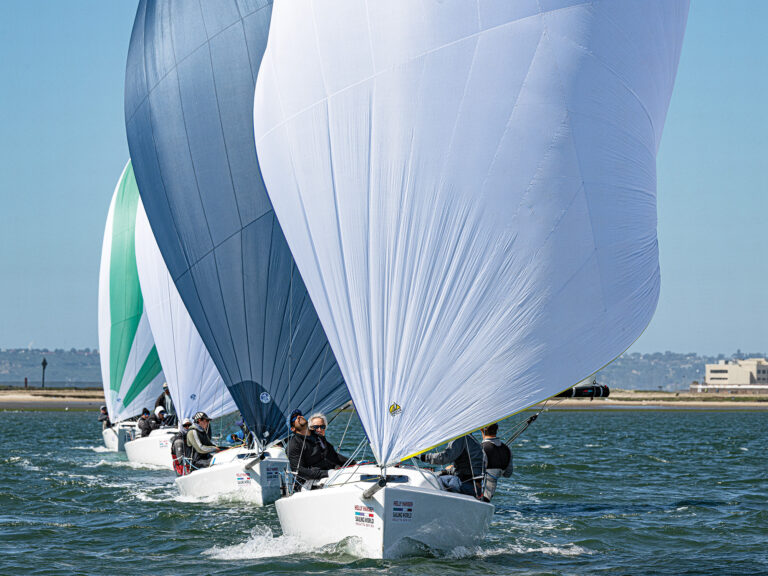With 10 seconds to the start I’d positioned my Laser perfectly. At the gun I jumped into the lead against 57 boats. I was feeling good. But the wind was light. At 200 pounds I was heavier than the sailors around me. Within two minutes I’d been passed to windward and to leeward. Ouch! Just as I was becoming overwhelmed with despair, it dawned on me I should just sail for fun and see what I could learn. Overcoming emotions is hard, but a positive attitude always helps. In the Laser I made a quick mental list of techniques that could help including limited tacking, not worrying about sailing in disturbed wind, keeping the boat footing fast, and studying the water for the best wind. Race 1 ended poorly with a 32nd-place finish. OK, there was plenty of room for improvement. Everybody has had similar experiences at the start of a regatta. Be intentional about changing your attitude. Set specific goals, and think more about learning than winning. It amazes me that if you stop worrying about the outcome of the race, your performance on the water improves. Unexpected things happen in light wind. In large fleets there are often big shake-ups. Don’t worry about other boats sailing faster; think about copying their techniques. And look for opportunities to gain in the next big shift. The biggest mistake sailors make in light wind is pinching. Focus on speed instead of height. Experiment by making one adjustment at a time. Observe your performance. Small adjustments can make a big difference. And don’t forget to sail light. Leave everything you don’t need on the dock. By using these techniques I was able to move up to fifth for that weekend Laser series, but regardless of the result I was having more fun because I was learning as I went. If you’re stumped during a regatta, ask questions. Most sailors will talk and help. In one maxi boat regatta our boat kept losing on the downwind legs. I asked a rival tactician what he saw, and he pointed out that we always seemed to be splitting from the fleet. Pretty obvious on reflection, but I hadn’t been able to step back and see it myself. From then on, as you can imagine, our boat was positioned in the middle of the pack. When the going gets tough, you can also think back to past successes to boost your spirits. Prevailing in sailing begins with a winning mindset. It’s important to remember you can’t control everything on the water. The secret is to play the percentages and make the most of bad situations. After the start of a windy distance race off Miami, our boom split in half. It was quite a setback with 160 miles to go. Without hesitation one crewmember picked up the spinnaker pole and started lashing it to the boom. The jury rig took a full hour, but soon we were sailing efficiently. The next morning we crossed the finish line and learned that we’d won the race on corrected time by exactly one second. Had we given up, or had our crew not figured a way to jury rig the boom, we wouldn’t have been close. Subtle problems are harder to figure out. At the helm in an Etchells regatta, I kept losing distance on the windward legs. It was frustrating. To figure out a solution, I made a point of starting near the leading boat the next race. By comparing our performance I realized I was allowing the boat to repeatedly scallop up into the wind because the mainsail was overtrimmed. As the competitor began inching away, I made some adjustments to my trim. The mainsail was eased and I worked to keep my course straight. Soon I was able to match the speed of the leader. Observation and experimentation made the difference. Solutions might be difficult to generate during a race. At the end of a day, however, there’s plenty of time to reflect on your performance. One time I sailed three weekend J-22 regattas in a row. At each event I struggled on Saturday, but came back to win on Sunday. It felt like a football team going into the locker room at halftime behind and always having to rally to win. In fact, that’s what I was doing, and you can rally, too. To improve, I spent Saturday night listing the problems and then figuring out the answers before Sunday’s races. In the first event, my poor starts allowed other boats to push us to the unfavored side of the course. Good starts on Sunday made the difference. During the second event a wrapped spinnaker and pinching while sailing to windward spoiled Saturday. It took courage to put my bow down on Sunday but we sailed faster. We practiced our spinnaker work before the first start and were flawless that day. In the third regatta I found myself chasing the wind all over the course. Too many tacks put us behind. On Sunday, I picked one side of the course and stuck to the game plan, which worked. The secret to improving is to define your problems and methodically draw on past experiences, talk to other sailors, and experiment. You can always learn and make progress, and more than anything else, that’s what makes racing sailboats the most fun and satisfying.









